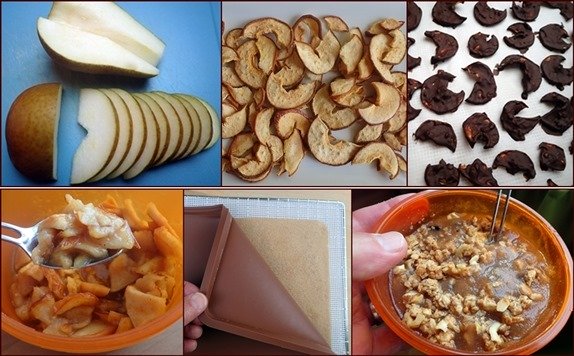Dehydrating Pears & Pear Fruit Leather
Slicing and dehydrating pears is just the first project that you will find in this article. Dip dehydrated pears in chocolate, cook them with apples before drying, and sweeten and dry the peels. Explore how to make pear fruit leather, and how to rehydrate it in 10 minutes back into pear sauce for a healthy blueberry-crunch dessert.
Photo: Try dehydrating pears and dipping them in chocolate, or rehydrate pear fruit leather into Blueberry-Crunch Pear Sauce Dessert in 10 minutes with cold water.
Table of Contents
Chocolate Covered Dehydrated Pears
Dehydrating Cooked Pears & Apples
Dehydrating Sweetened Pear Skins
How to Make Pear Fruit Leather
Dehydrating Pears
Dehydrated pears make delicious fruit snacks. They are sweet and less chewy than dried apples. In addition to enjoying them dry, try rehydrating them in cold water with other fruits to make fruit cocktails for hot summer afternoons on the trail.
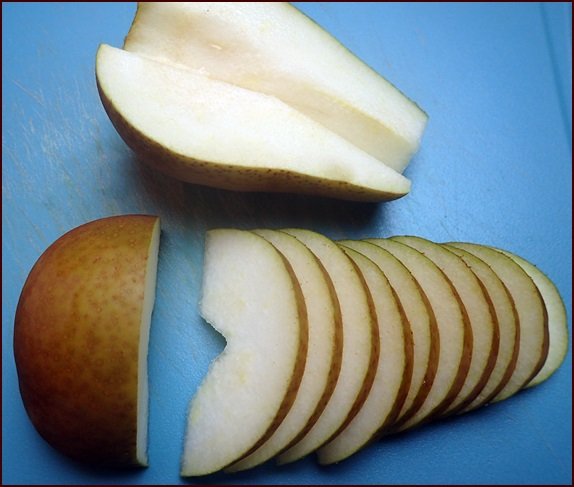
Photo: Pear cut into half, seed core removed, and sliced thinly.
Steps:
1. Wash and dry pears. They are easier to cut if you leave the nutritious skins on.
2. Cut pears into halves or quarters longwise. Cut out the fibrous parts that run down the center from the stem, and cut out the seed cores.
3. Slice pear sections crosswise ⅛-inch to ¼-inch thick.
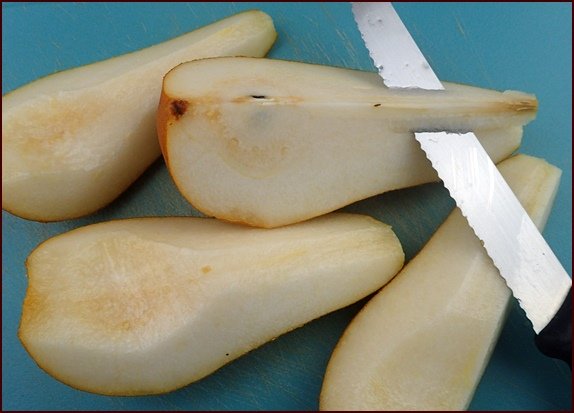
Photo: Removing the fibrous part and core of a quartered pear before slicing crosswise.
4. Place sliced pears in a single layer directly on a nonstick mesh sheet.
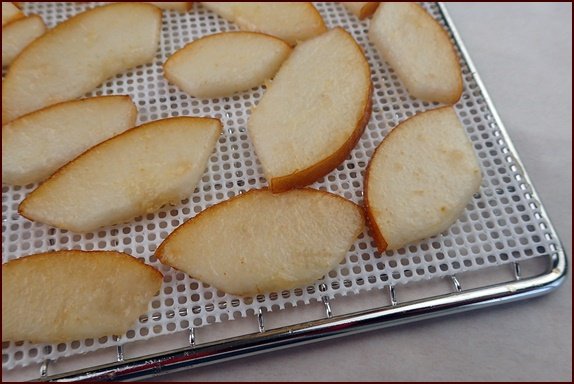
Photo: Sliced pears on silicone nonstick mesh sheet over Cosori Dehydrator stainless steel tray.
Dehydrate:
The temperature for dehydrating pears is 135°F (57°C).
Dehydrate for 8+ hours. Thicker slices will take longer to dry. Dried pears will be pliable with no moisture showing when you tear a piece in half.
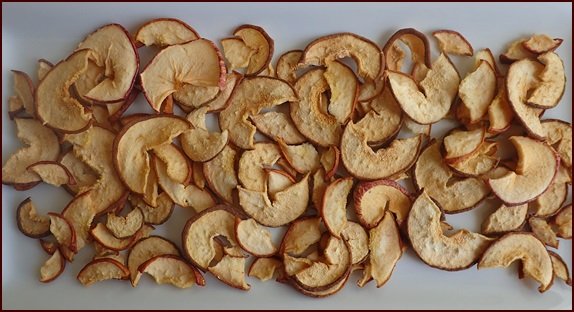
Photo: Sliced pears after dehydrating for 8½ hours.
Yield: 2-3 pears (2½ cups of sliced pears weighing 300 g) dried on 1 Cosori dehydrator tray will yield 1 cup of dried pears weighing 45-50 grams.
Storage & Shelf Life of Dehydrated Pears
After pears have cooled, store them in an airtight container away from heat and light. If using jars, enclosing an oxygen absorber will reduce the natural browning effect caused by oxidation. Check container after a few days for any sign of moisture on the inside of the container. It there is any moisture, return pears to the dehydrator for a few more hours. Dried pears have a shelf life of a year or more, but eat them sooner because they are so delicious!
Chocolate Covered Dehydrated Pears
The best chocolate for making chocolate covered pears is dark chocolate. Use plain chocolate with a high cocoa percentage or dark chocolate infused with intense pear flavor. The Lindt brand is delicious.
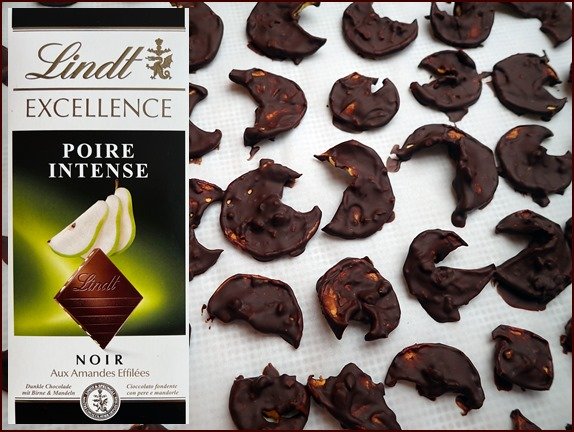
Photo: Dehydrated pears dipped in melted Lindt chocolate.
Melt chocolate using the double-boiler method.
Steps:
1. Add an inch of water to a saucepan. Place a heat-safe bowl inside the saucepan. To reduce direct heat transfer, put a couple of spoons in the pan to elevate the bowl off the bottom of the pan.
2. Chop chocolate into smaller pieces and place inside bowl. Turn the heat to medium. It’s not necessary to heat the water to a boil. Stir the chocolate until it is melted.
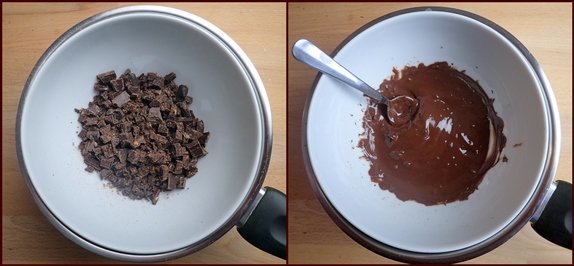
Photo: Melting chocolate before and after.
3. Drop dried pear slices into melted chocolate a few at a time and stir until fully coated.
4. Transfer chocolate covered pears to a nonstick tray, nonstick sheet, or tray covered with parchment paper. Place in refrigerator for 15 minutes to harden chocolate.
Store coated pears in jars or Ziploc bags. They hold up well at room temperature, but are especially delicious cold if you store them in the refrigerator. They are not practical for summer hikes, since the chocolate melts.
Explore More: How to Make Chocolate Covered Oranges.
Dehydrating Cooked Pears & Apples
Cooking and dehydrating pears with apples is another way to enjoy pears on the trail. Adding fresh lemon juice and honey creates a whole new taste sensation, whether you eat them dry as a snack, or rehydrate them with hot water for a healthy accompaniment to breakfast or dinner.
Servings: 3
Ingredients:
- 2-3 pears (250 g)
- 2-3 apples (250 g)
- 1 lemon (zest + 2 Tbsp. juice)
- 1 Tbsp. honey
This quantity fills one Cosori dehydrator tray.
Cooking & Dehydrating Pears
1. Wash pears and apples, then cut them into pieces ¼-inch thick with the skins on.
2. Place cut pears and apples in pot with the grated zest of one lemon plus the juice. No water is needed.
3. Turn on stove to medium high until liquid starts to bubble and fruit starts to steam. Then, reduce heat to low and let fruit simmer for 15 minutes, keeping lid on the pot. Fruit will release liquid, so it should not burn. Just in case, check fruit after 10 minutes and add a tablespoon of water if necessary.
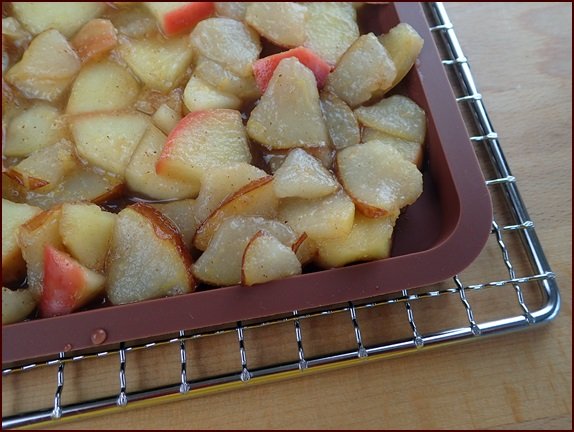
Photo: Cooked pears and apples in a silicone nonstick tray over Cosori dehydrator tray before drying.
4. Place cooked fruit on a nonstick tray with all the loose juices. It’s ok to have overlap.
5. Dehydrate at 135°F (57°C) for approximately 14+ hours. Dried fruit will be pliable and a little sticky. If you want it less sticky, dry it a few hours longer.
Yield: Recipe as prepared (2½ cups cooked fruit, 522 grams) yields 1½ cups dried fruit, 108 grams.
Store dried pears and apples in an airtight container after they cool. If moisture appears on the inside of the container, return the fruit to the dehydrator for a few more hours.
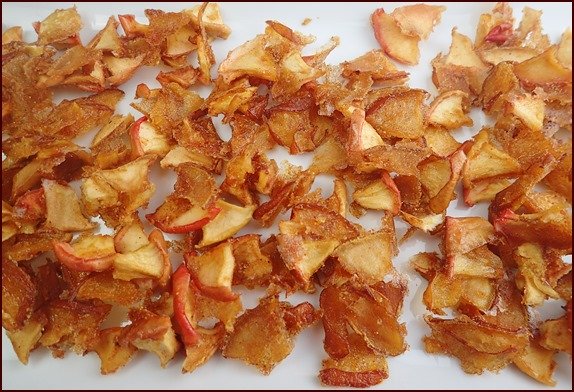
Photo: Dehydrated pears and apples cooked with lemon juice and honey. They are wonderful to snack on dry, but amazing when rehydrated with hot or cold water.
Rehydrating Cooked & Dried Pears
Servings: 1
Cover ½-cup dried fruit (30 g) with ¼-cup up to ½-cup water.
Hot water: Bring fruit and water to a bubble in a pot and set aside with lid on for 15 minutes. Alternatively, add boiled water to fruit in a separate container.
Cold water: Add water to fruit in a container with a tight fitting lid and hike on. Wait an hour or more for best rehydration.
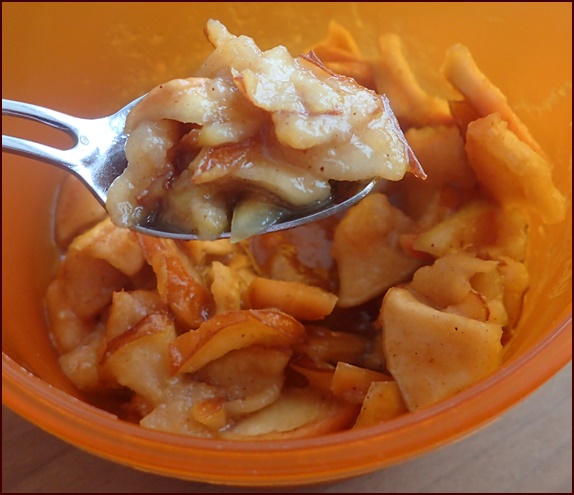
Photo: Dehydrated cooked pears and apples after rehydrating with boiled water.
Dehydrating Sweetened Pear Skins
Skins are usually left on when dehydrating pears, but they are typically removed when making pear fruit leather. The skins are loaded with antioxidant and anti-inflammatory compounds, so don’t send them to the compost pile!
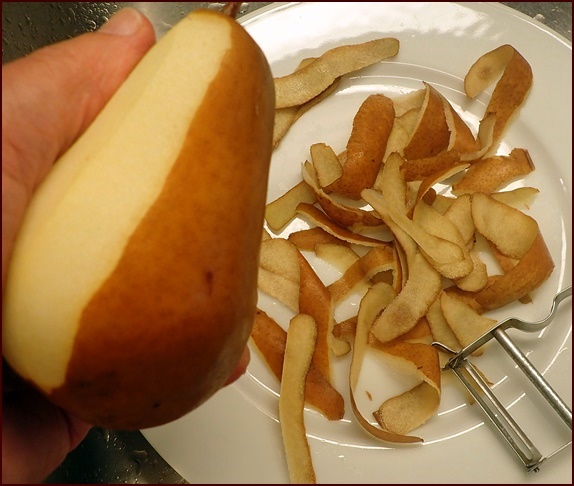
Steps:
1. Wash and dry pears, and remove the skins with a peeler. The skins of 5 pears will fit on 1 Cosori dehydrator tray.
2. In a small bowl, add a ¼-cup of hot tap water to 1 tablespoon of sugar and ¼ teaspoon of cinnamon. Stir until sugar dissolves. Honey may be used in place of sugar, but it will compete with the pear flavor of the dried skins.
3. Pour sweetened water over skins of 5-6 pears, stir to coat, and let sit a few minutes.
4. Place sweetened skins including all juices on a nonstick sheet and dehydrate at 135°F (57°C) for 9+ hours until crispy. After 5-6 hours, peel skins off nonstick sheet and rearrange skins to ensure complete dehydration.
Store dehydrated pear skins in an airtight container at home and carry in a Ziploc bag on the trail.
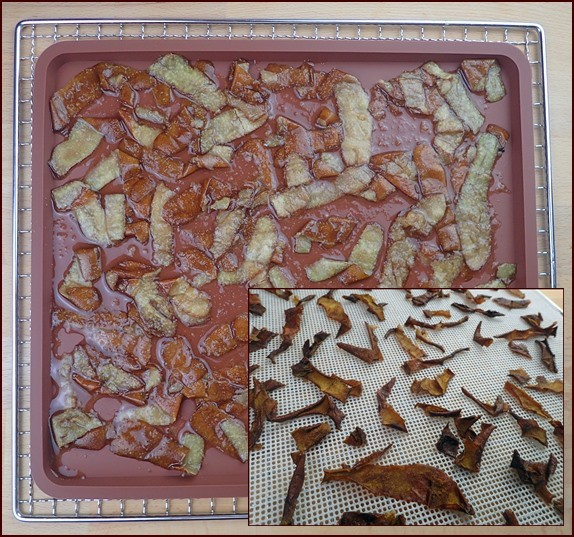
Photo: Sweetened pear skins from 5 pears before and after dehydrating.
Dehydrated pear skins are great for snacking on “as is,” or you can include them in trail mixes. Try adding them to oatmeal or on top of backpacking desserts.
How to Make Pear Fruit Leather
Pear fruit leather is one of the fruit leathers that tastes amazing with just pears and no other fruits or juices added to it.
Steps:
1. To make 2 pear fruit leathers, peel 5 pears and cut them into smaller
pieces. Five pears will yield approximately 3 cups of blended pears.
2. Place in a blender with 2 tablespoons of water. Blend to a smoothie-like consistency.
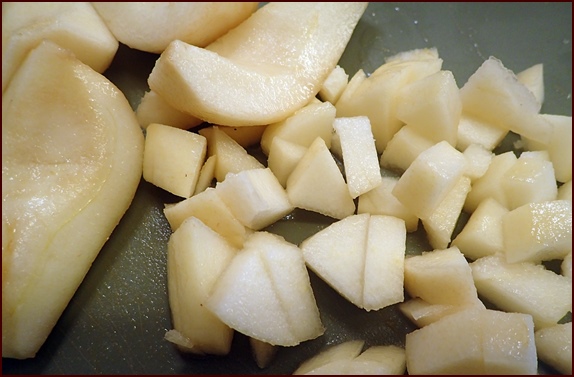
Photo: All you need is pears to make 100% pear fruit leather.
3. Spread 1½ cups of blended pears on each of 2 nonstick sheets or trays.
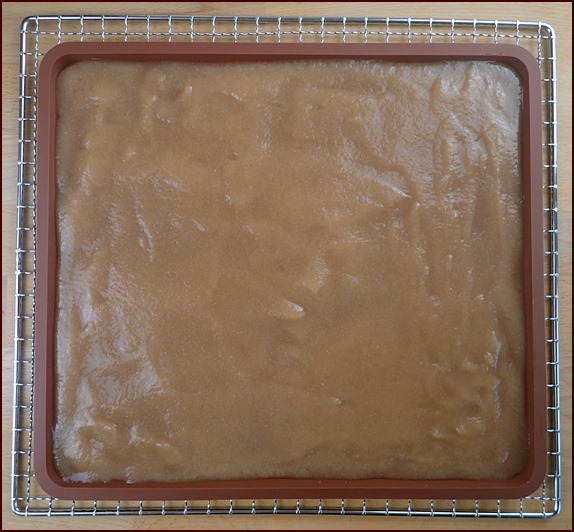
Photo: 1½ cups of blended pears on silicone dehydrator tray before dehydrating.
4. Dehydrate pear fruit leather at 135°F (57°C) for 9+ hours.
Flip It!
When the pear fruit leather is substantially dry after approximately 8 hours, flip the tray over onto a nonstick mesh sheet and peel off the nonstick sheet.
Flipping ensures the underside of the leather dries completely.
Continue drying until the leather is pliable. It should bend without breaking. If very ripe pears were used, the leather may be a little sticky, but it should not be tacky when dry.
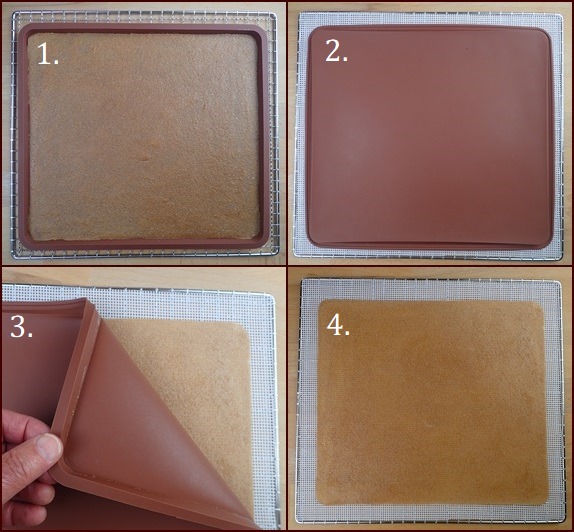
Photo: Steps for flipping pear fruit leather.
Packing and Storing Pear Fruit Leather
Fold fruit leather up into 3-4 columns using parchment paper. Then fold in half. You can pack several folded leathers into a single sandwich-size Ziploc bag. At home, store wrapped fruit leathers in a container with a good sealing lid, like Tupperware. This will keep the leather from absorbing moisture from the air. Fruit leather has a long shelf life and should last a year or more if stored away from moisture. Most likely, you will eat it way before then.
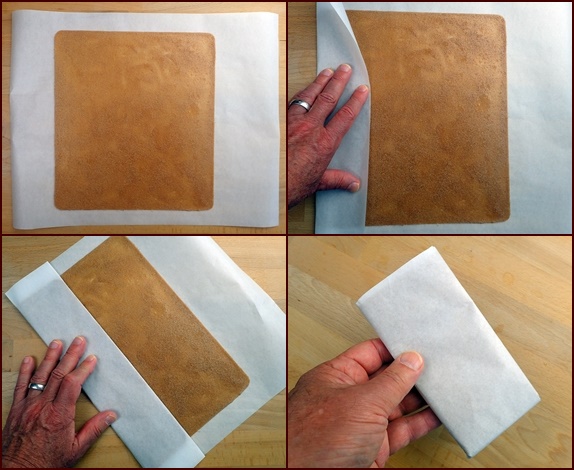
Photo: Folding up 100% pear fruit leather before packing in a Ziploc bag.
Blueberry-Crunch Pear Sauce Dessert
Pear fruit leather tastes great “as is.” The creases from packing it folded make tearing off sections easy, so you can snack while you walk. But, if you can hold off until after dinner, an amazing dessert awaits you.
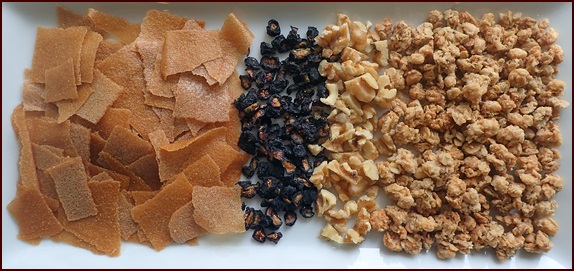
Photo: Pear fruit leather, dried blueberries, chopped walnuts, and granola.
Servings: 1 large
Ingredients:
- 1 sheet of pear fruit leather (50 g)
- ⅛ cup dehydrated blueberries (10 g)
- ⅛ cup chopped walnuts (15 g)
- ½ cup granola (50 g)
- 1 cup cold water (236 ml)
Preparation:
Add half the water to pear fruit leather pieces and blueberries in a bowl. Let sit for a few minutes, and then stir briskly with a spoon to break down the leather. When most of the leather has turned to sauce, add the rest of the water and continue stirring until creamy, about 10-15 minutes.
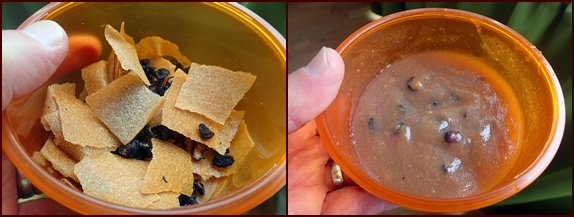
Photo: Dried pear fruit leather and blueberries before and after rehydrating with cold water.
Stir in granola and nuts. If travelling with a partner, you could split this dessert after dinner, but then again… it’s really delicious. One hungry hiker could easily take it down.
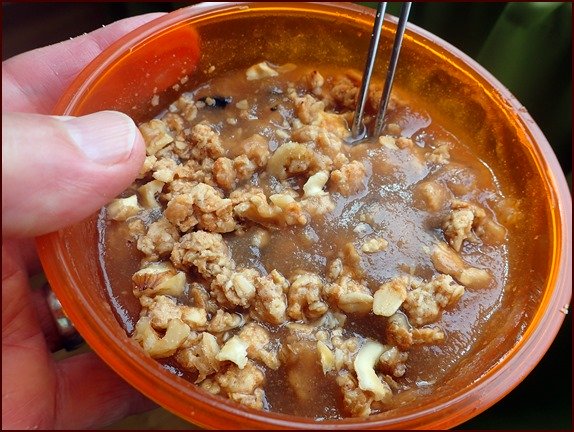
Photo: Blueberry-Crunch Pear Sauce Dessert
Cosori Dehydrator & Accessories
Shop Amazon for the Cosori dehydrator and accessories used for dehydrating pears and fruit leather on this page. The silicone trays and silicone mesh sheets are flexible, truly nonstick, and are very easy to clean. Mesh sheets can be cut to size with scissors.

Left: Silicone Dehydrator Trays with Raised Edges, 11.8" x 10.8", 6-Pack
Middle: Cosori Dehydrator, Stainless Steel, 6-Trays
Right: Silicone Mesh Dehydrator Sheets, 14” x 14”, 12-Pack
Disclosure: As an Amazon Associate, Backpacking Chef earns from qualifying purchases. Thank you!
More Pear Fruit Leather Recipes
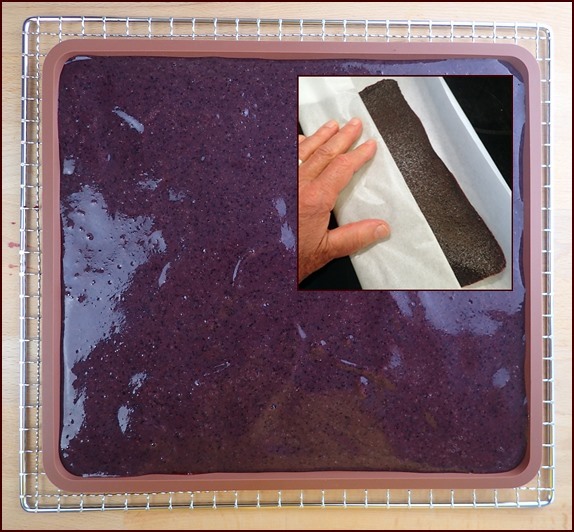
Photo: Blueberry-Pear Fruit Leather.
Pears are excellent when combined with berries to make fruit leather. Blueberries have a lot of skin, which causes blueberry fruit leather to be crumbly if not combined with other fruits. Raspberries and blackberries have a lot of seeds, so mixing those berries with pears makes a less-seedy fruit leather.
Follow the instructions for blending and dehydrating 100% pear fruit leather, and try these combinations:
All mixes will make 2 leathers. Snack on “as is,” or rehydrate into saucy desserts.
Berry-Pear Fruit Leather
- 350 g berries, any kind
- 350 g pears
Peach-Pear Fruit Leather
- 350 g peaches
- 350 g pears
Kiwi-Pear Fruit Leather
- 350 g kiwi
- 350 g pears
Apple-Pear Fruit Leather
- 350 g apples
- 350 g pears
Share this page with friends on social media.
Free E-book & Newsletter
Free with Trail Bytes subscription.
Dehydrating Food from A–Z

